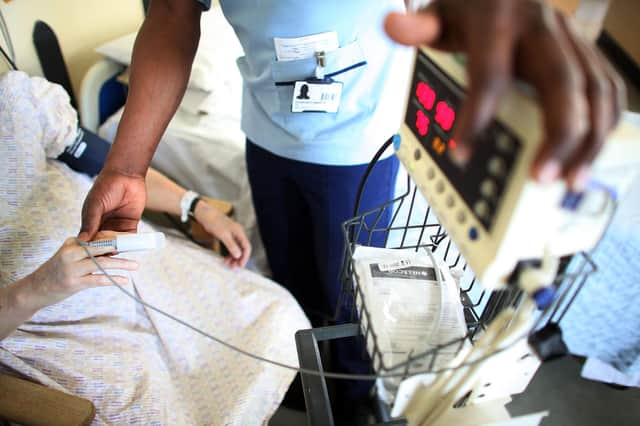Covid in Scotland: Conditions for NHS staff must improve or experienced staff will be lost – Mike McKirdy


As we approach the pandemic's next phase, strategies must be centred around adapting and renewing the health service through advanced facilities, working methods, and, most importantly, enhancing the environment and practices of our exceptional workforce.
The surge in Covid-related treatment has affected care for other illnesses across the board, and the effects of this will be long-lasting. The Scottish government’s NHS recovery plan outlines how the backlog will be addressed while continuing to meet the country’s ongoing, urgent healthcare needs. This must be delivered.
Advertisement
Hide AdAdvertisement
Hide AdWaiting lists have reached record levels, with the latest figures, from September, showing a 7.4 per cent increase in patients waiting to be seen and a 3.1 per cent rise in those waiting more than 78 weeks.
As NHS Scotland build backs the capacity to deal with urgent and routine healthcare, whilst continuing to operate safely, we must focus on recovery, renewal and well-being of staff for the benefit of patients.
Crucially, plans for additional funding must take account of the need for sufficient staffing levels to provide essential services.
NHS Scotland’s workforce statistics for 2021 revealed vacancies for medical and dental consultants, allied health professionals, nursing and midwifery posts have increased significantly on last year, with 4,812 reported.
Without improvements to working conditions, experienced staff will be lost and new recruits harder to attract and retain.
An RCN Scotland survey found three-out-of-five nurses are considering leaving their job due to persistent and growing pressures. Unrealistic workloads are being translated into widespread levels of dissatisfaction. With an increasing number of posts to fill, we must call on the Scottish government to act and ensure nursing is seen as the attractive and rewarding profession that it is.
The task ahead is sizeable, but we have already seen rapid transformations in digital health, collaboration, and flexible working patterns. How far, fast and in what shape clinical services continue to adapt will be fundamental to the overall renewal of health and social care. We need to ensure the continued delivery of education and training to build the workforce of the future.
As the Scottish Academy of Medical Royal Colleges highlighted, the shift to remote medical consultations in secondary and primary care and mental health services has worked well but will require considerable support to be sustainable whilst social distancing rules remain.
Advertisement
Hide AdAdvertisement
Hide AdStaff well-being is recognised as being crucial to safe and effective patient care and must continue to be prioritised in the aftermath of the Covid-related, mental health burden expected ahead.
With further financial investment for staff support detailed in the 2021-2026 NHS Scotland recovery plan and the 2021-22 winter plan, these commitments are welcomed within the professions.
As we take forward the renewal of the NHS, there is a strong sense of optimism and hope. I believe the last two years, though very challenging, have shown just how capable we all are when working together in partnership: patients, practitioners, and politicians. I remain confident in the ability of our remarkable workforce in dealing with crises and continue to be enormously proud to be a part of the NHS.
Mike McKirdy, president of the Royal College of Physicians and Surgeons Glasgow
A message from the Editor:
Thank you for reading this article. We're more reliant on your support than ever as the shift in consumer habits brought about by coronavirus impacts our advertisers.
If you haven't already, please consider supporting our trusted, fact-checked journalism by taking out a digital subscription.
Comments
Want to join the conversation? Please or to comment on this article.
